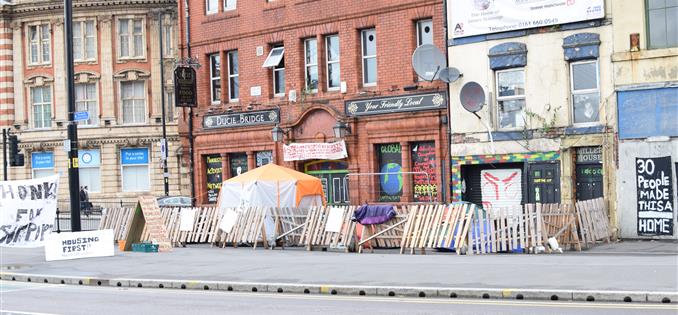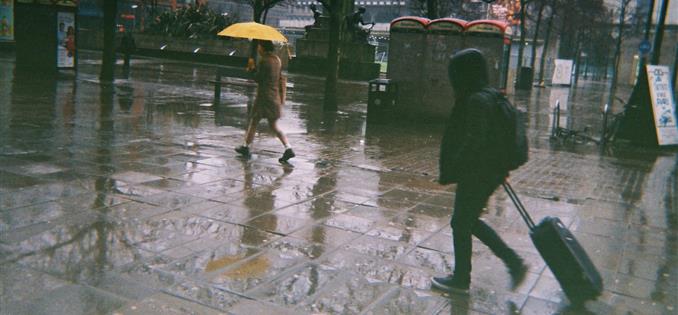“Spare any change, please?" An interaction anyone that enters Manchester city centre will experience, often several times per street. It’s a disempowering moment for both parties and one we live more often each week.
The prosperous economy brings in the dreamers who with no previous Manchester address won’t be helped by the City Council
Los Angeles city council, Manchester’s US twin city, urged for an official State of Emergency to be called in August as the numbers of its homeless rose 11% in one year. Over the same period rough sleepers in Manchester grew by 44%. The year before it was 79%.
Manchester City Council found 70 rough sleepers in the city centre last year, ten times more than in 2010. However, the reality paints a different picture. A person is classified as rough sleeping only if during the November count they are ‘bedding down’ within a set boundary. That doesn’t include those walking, sitting, on a sofa, in overnight or temporary accommodation, and so on.
More than 5000 individuals approached the council to declare themselves homeless over twelve months in 2015/16. Around 550 families had become homeless and 244 people took advantage of emergency winter accommodation. The most dramatic rise in homelessness was among women and young people aged 16-21.
Less than 40% of those that present themselves at the Town Hall will be officially recognised as homeless. According to a Manchester-based housing solicitor, many are turned away for ‘not being in desperate need’ or holding rental arrears and therefore deemed ‘intentionally homeless’.
For its part, the council is facing a crisis of unprecedented magnitude, all the while having its Whitehall-fed budget cut by over a third. National policy is creating a crisis for the city to fix.
Homelessness has risen 54% in England since 2010. Under the 2013 benefits cap, housing benefits are the last to be awarded, often not at all after the cap has already been reached. Equally, many working people on low wages are being priced out of a soaring and unregulated private rental sector.
The bedroom tax has forced downsizing, but those smaller properties simply don’t exist in a country that turned its back on social housing a long time ago. Tenants whose records are unfavourable, despite diagnosed mental health issues, are competing for living space and losing out to families.
“It’s a regional problem that’s highly concentrated in the city centre,” says Jez Green of homelessness charity Mustard Tree on why Manchester is witnessing such visibly high levels of homelessness.
 A number of squatters camps have popped up across the city, including this site outside the Ducie Bridge
A number of squatters camps have popped up across the city, including this site outside the Ducie Bridge
The city offers a chance for people to disappear into the crowd or find safety in numbers. The numerous, well documented volunteer-led groups providing food and medical provisions to rough sleepers edge on becoming a victim of their own success, drawing more people into the city.
The prosperous economy brings in the dreamers who with no previous Manchester address won’t be helped by the City Council; 24% of the city’s recorded rough sleepers are European Economic Area migrants.
The protest camps and squatting sites such as the Stock Exchange and Ducie Bridge pub have handed the city centre a recognisable homeless movement. Often the accommodation offered by the authorities is below a standard or not private enough to entice people off the streets or out of the occupations.
The easy access to drugs has created a party atmosphere. Legal highs, sold in convenience stores around the city, made it difficult for council and charities to deal with paranoid, withdrawn and often aggressive users. Their proscription has brought in the drug dealers and consequently pushed some users out of the centre, away from help.
Manchester City Council has recognised that the issue of homelessness is one it can’t handle on its own. In partnership with local businesses, homeless people and the charity sector the Manchester Homelessness Charter was launched this summer under the umbrella Manchester Homelessness Partnership.
More businesses are being urged to make a pledge through the Street Support network. Developer Allied London has lead the way in ownership of an issue that directly affects trade and property, donating tens of thousands and opening employment opportunities.
Several of the city’s restaurants are chipping in too, feeding the homeless through initiatives such as Not Just Soup. The collective, led by local businessman Sam Jones of Tunafish Media, has dished out over 9,000 meals since it launched last year. "It's overwhelming to see so many local restaurants supporting the homeless community," says Jones, "and it doesn't stop at food - we've even had some offering job opportunities and training, which is something we're hoping to explore further."
 The My Manchester Project encourages those affected by homelessness to tell their story through the lens of a camera
The My Manchester Project encourages those affected by homelessness to tell their story through the lens of a camera The arts also have their part to play, particularly for the more than 50% of rough sleepers who suffer mental health issues. Several of the city’s charities, including the Booth Centre, offer courses in drama, creative writing and painting. The Boaz Trust partnered the poignant My Manchester project, in which the homeless community was handed cameras to capture their vision of the city.
How to react when you’re asked for spare change isn’t obvious. Some of the city’s prominent homeless charities have grouped together under the Big Change campaign, to encourage donations to organisations that can help people get off the streets, rather than keeping them there through feeding addiction.
While waiting for emergency funds that may never come, the city of Manchester must be the sum of all its parts to tackle the most visible issue facing the city.
Perhaps the most pragmatic step, however, might be hardest for most people. “It’s OK just to speak to homeless people,” says Jez of Mustard Tree. “Just ask them how they’re doing”.
 Powered by Wakelet
Powered by Wakelet












